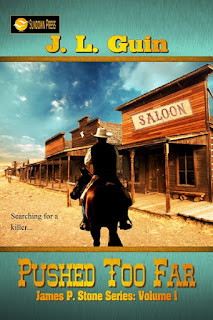By Tom Rizzo
Bounty Poachers, the latest novel by J.L. (Jerry) Guin, represents the third of a four-book series featuring Deputy U.S. Marshal James P. Stone. (Pushed Too Far, Book 1, & Lawman’s Gun (Book 2).
This time, Stone picks up the trail of two brothers who hunt men for bounty. Once, hard-working farmers, the two siblings turn bounty hunters as a way to survive.
But success heightens their hunger for bigger paydays and one of the brothers comes up with a unique idea: killing other bounty hunters and poaching their captives.
But success heightens their hunger for bigger paydays and one of the brothers comes up with a unique idea: killing other bounty hunters and poaching their captives.
- GUNSLINGER 6 -
1. The name of your latest novel is BOUNTY POACHERS. Tell me a little about the title and how you came by it.
Actually, the title came about after I had written the third chapter. I felt Bounty Poachers was a perfect title because of how the story was developing.
2. What served as the inspiration for the story? What triggered the idea for the novel or the characters?
Lots of authors write about Old West bounty hunters. I wanted something a little different. The brothers, Jasper and Jason, are two young men, who lived and witnessed their parent's failure to scratch out a living on a Nebraska homestead.
With both parents passing, Jasper became hardened by the hand that was dealt them. He saw life as it was on the frontier, tough and demanding. Jason, being of a softer nature was used to doing as he was told by his parents. Afterward, he just went along with whatever his older brother proposed.
With both parents passing, Jasper became hardened by the hand that was dealt them. He saw life as it was on the frontier, tough and demanding. Jason, being of a softer nature was used to doing as he was told by his parents. Afterward, he just went along with whatever his older brother proposed.
3. Antagonists play a vital role in storytelling. Yours happens to be two brothers, broke and desperate. But are they motivated by something other than mere survival? What are their good qualities?
If not for circumstance, the brothers most likely would have lived as farmers their entire life. Jasper took the temperament of his father, lashing out when things didn't suit him.
Jason took on the qualities of his mother, quiet, reserved and agreeable. It was Jasper who came up with the idea of hunting men for bounty. He hated groveling for a mundane job for little pay.
Later, the idea of killing a bounty hunter and poaching his captive was his too. He had no plans to return to farm life. Bringing in wanted men were paying off.
Jason took on the qualities of his mother, quiet, reserved and agreeable. It was Jasper who came up with the idea of hunting men for bounty. He hated groveling for a mundane job for little pay.
Later, the idea of killing a bounty hunter and poaching his captive was his too. He had no plans to return to farm life. Bringing in wanted men were paying off.
4. Deputy US Marshal James Stone is the main character—someone you’ve written about in two other novels. Who is Stone? Why should a reader care about him?
James Stone was introduced in PUSHED TOO FAR (first in the series) He and his freighting partner were accosted and robbed in their nighttime camp in the territory.
During the robbery, Eldon Greyson, Stone's mentor, neighbor, and partner was killed. Stone heard one of the robbers call out the name of “Laird” just before he was knocked out. After walking to safety, Stone dedicated himself to finding and killing Laird.
During the robbery, Eldon Greyson, Stone's mentor, neighbor, and partner was killed. Stone heard one of the robbers call out the name of “Laird” just before he was knocked out. After walking to safety, Stone dedicated himself to finding and killing Laird.
While chasing after a train robber, his travels take him to Eaton, Kansas where he becomes a deputy sheriff then meets Deputy Marshal Jackson Millet.
Millet invites him to become a deputy U. S. Marshal. In Book two–LAWMAN GUN—Stone becomes a U.S. Deputy Marshal, with the idea that the position would allow him to continue his search for Laird.
Millet invites him to become a deputy U. S. Marshal. In Book two–LAWMAN GUN—Stone becomes a U.S. Deputy Marshal, with the idea that the position would allow him to continue his search for Laird.
Coming up with a suitable ending to the book. Stone still hadn't located Laird so in order to do so required another volume to be written. Book four DUE JUSTICE will be out soon. I'd like to note that the fine folks, Cheryl and Livia over at Sundown Press have been just great in publishing this series.
6. What is the first story you ever published and how do you think of it now?
In 1995, Douglas Sharp asked for submissions to his little magazine called Western Digest up in Calgary. I sent in my story “Caught Red Handed.” It wasn't a very good story but it was my first and I was ecstatic when Douglas sent me a check for $15.00.
I went on to write 6 more stories for Western Digest. It has been a fun ride since then and I am still learning.
- 0 -
Jerry and his wife Ginny live in northern California. A prolific writer, he has authored over 40 short stories and 15 novels.
- 0 -
614-607-0949
























